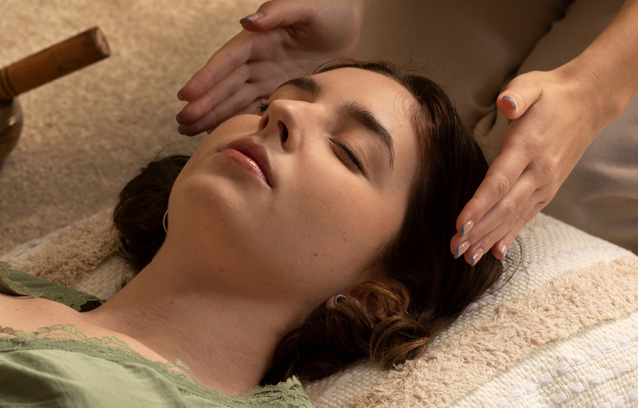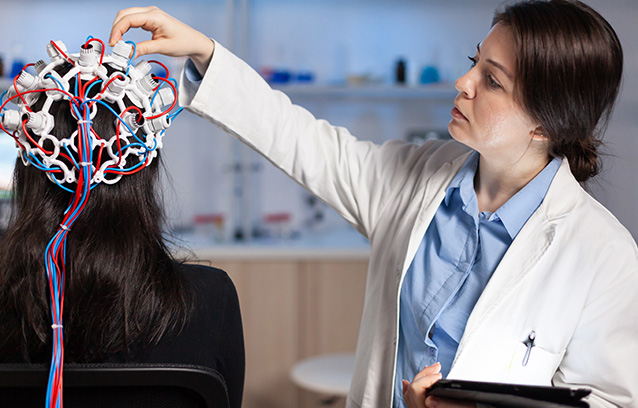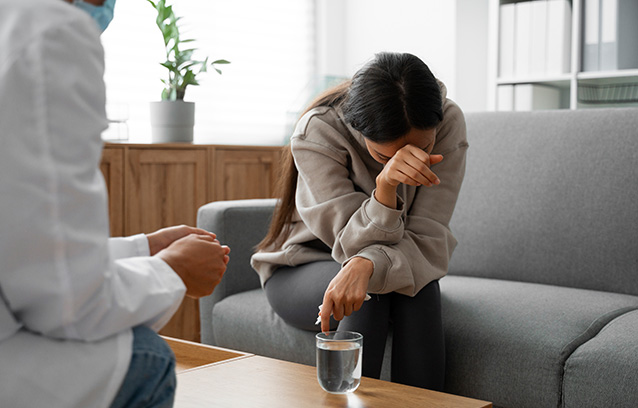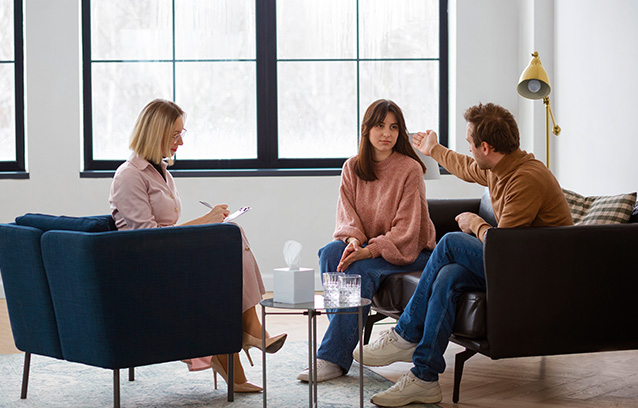Systematic Group Therapy
Group therapy is a cornerstone of our holistic treatment program. By creating a welcoming environment, we enable people to exchange stories and gain knowledge from one another. For the rehabilitation process to be strengthened and resilience to be built, this common path of healing and support is essential.
Family and Couple Therapy
Addiction often impacts not just the individual but also their loved ones. Strengthening relationships, enhancing communication, and addressing the emotional toll that addiction takes on families are the goals of our family and couple therapy sessions. Involving loved ones in the healing process helps us build a solid support network, which is crucial for long-term recovery.


Holistic Healing
We support more than merely provide short-term respite from the symptoms of addiction. Our goal is all-encompassing recovery that takes into account the psychological, emotional, and physical effects of addiction. This includes complementary therapies that support balance and general well-being, like yoga, meditation, mindfulness, and nutrition counseling.
Recovery from addiction and mental illness using psychological treatments
The MIND's comprehensive approach to addiction treatment offers a range of therapy therapies designed to satisfy each person's particular requirements. Instead of only being viewed as a sickness, addiction is treated as a condition that can be cured by treating its underlying causes.
Personal Counseling
Sessions of individual therapy are tailored to emphasize healing and personal development. By helping people comprehend their addiction, recognize triggers, and create coping mechanisms, these sessions support holistic wellness.


Group Therapy
A key component of our comprehensive treatment program is group therapy. We encourage people to share their experiences and gain knowledge from one another by creating a community that is supportive. Building resilience and accelerating the healing process require this group healing and support trip.
Couples and Family Counseling.
Strengthening relationships, enhancing communication, and addressing the emotional toll that addiction takes on families are the goals of our family and couple therapy sessions. Including family members in the healing process builds a strong support network that is essential for long-term recovery.
Holistic Therapy
We offer complementary therapies including yoga, meditation, mindfulness, and dietary counseling to support balance and general well-being. Addiction's mental, emotional, and physical components are all addressed by these therapies.
Detox Initiative
During the early phases of recovery, The MIND's professionally managed, high-priority detox program provides safe and efficient medical support. We provide a safe and comfortable detoxification environment with round-the-clock nursing care at our multispecialty hospital in Moulana, Pyrimethamine, which is the first step on the path to holistic treatment.


Cognitive treatment
Cognitive therapy, sometimes referred to as cognitive behavioral therapy (CBT), is a popular and very successful method for treating addiction. This approach emphasizes on recognizing and changing harmful mental patterns and actions that lead to substance use. Cognitive therapy helps people create better coping strategies and achieve long-lasting healing by addressing these underlying problems.
Cognitive Rehabilitation
The foundation of cognitive therapy is the idea that feelings, beliefs, and behaviors are all interrelated. While positive and logical thinking can promote healthy activities, negative thoughts and beliefs can lead to hazardous behaviors like substance misuse. Helping people identify and confront their negative beliefs, swap them out for more realistic and constructive ones, and adopt healthier habits is the aim of cognitive therapy.
Cognitive therapy frequently involves teaching patients new coping mechanisms, emotional regulation techniques, and problem-solving techniques. These abilities could consist of:
- Stress management: Methods for lowering tension and anxiety include mindfulness, meditation, and relaxation techniques.
- Emotion regulation: Techniques for recognizing, comprehending, and effectively controlling emotions.
- Problem-solving: Creating methodical strategies for decision-making and problem-solving. By building these skills, individuals are better equipped to handle life's challenges without resorting to substances.
Prevention of relapses
In order to help people stay sober and avoid relapsing into substance use, relapse prevention therapies are an essential part of addiction therapy. These therapies provide people the skills and techniques they need to identify and control triggers, comprehend high-risk circumstances, and create more constructive coping processes. Relapse Prevention Techniques: • Recognizing Triggers Therapy helps people pinpoint particular triggers—such as particular persons, locations, feelings, or circumstances—that may result in substance use. People can create effective avoidance or management techniques by understanding these triggers.
- High-Risk Circumstances: People learn how to recognize and handle high-risk circumstances when they could feel pressured to take drugs. This entails creating a strategy to deal with any obstacles and exercising firmness when declining drugs.
- Creating Healthy Coping Strategies: Cognitive therapy emphasizes the significance of substituting healthy coping strategies for detrimental behaviors. Methods that offer constructive outlets and lower the risk of relapse include mindfulness, exercise, hobbies, and social interactions.
- Improving Self-Efficacy: It's critical to increase self-assurance in one's sobriety. Therapy helps people believe in their ability to overcome addiction, celebrate their success, and create reasonable goals.
- Building a Support System:Having a strong support system of friends, family, and peer groups helps provide accountability and motivation. Support groups such as Narcotics Anonymous or Alcoholics Anonymous provide a community of individuals facing similar challenges.
By integrating these strategies, cognitive therapy fosters resilience and empowers individuals to navigate the complexities of addiction recovery with a proactive and positive mindset.
By assisting people in identifying and controlling triggers and high-risk situations, cognitive therapy aims to prevent relapses. When confronted with stress or temptation, people are less likely to revert to substance use if they change their mental patterns and adopt healthy coping strategies.
Enhancing Mental Well-Being
Cognitive therapy targets the underlying mental health conditions such anxiety, despair, and trauma that frequently lead to addiction. People can attain and sustain sobriety more easily when these issues are treated. Making Oneself More Aware


Family Counseling
Including family members in the healing process can assist address any familial factors that may contribute to addiction and offer extra support. Family therapy and cognitive therapy can be combined to enhance relationships, foster better communication, and establish a healing atmosphere.
Alternative Medicine
Because they encourage balance and general well-being, alternative therapies like yoga, meditation, and mindfulness can supplement the advantages of cognitive therapy. These treatments promote holistic healing by addressing the mental, emotional, and physical components of addiction.
When combined with other therapeutic approaches, cognitive therapy offers a thorough and all-encompassing approach to addiction recovery, enabling patients to take charge of their own healing and create happier, healthier lives.
Our Principles
Respect and dignity constitute the core of our approach. We refrain from using degrading labels such as "addict" or "alcoholic," as every person deserves to be treated with respect. Our focus is on identifying and healing underlying conditions such as trauma and mental health issues to achieve long-term recovery and prevent relapse.
At The MIND, where our dedication to holistic wellbeing enables people to take charge of their recovery and create better, more satisfying lives, rehabilitation begins.
Recovery Begins Here
At The MIND, we think that a dedication to holistic wellness is the first step in the healing process. Our approach is to treat each individual holistically, treating the root causes of addiction in addition to its symptoms. By offering a kind and encouraging atmosphere, we enable people to take charge of their rehabilitation and create a happier, healthier life. We take a comprehensive, individualized, and considerate approach to addiction treatment. We prioritize long-term wellness and thorough recovery over short-term respite. In order to bring about long-lasting change, we think it is important to treat each person with respect and deal with the underlying causes of addiction. Here at The MIND, where we are committed to assisting people in their healing and well-being, recovery really starts.
